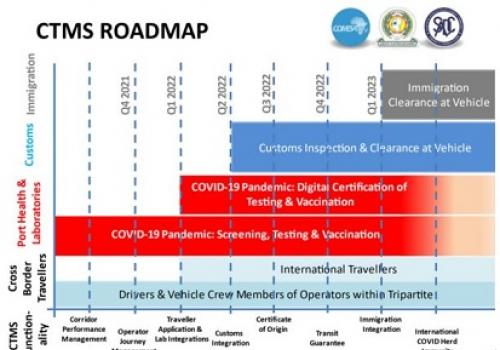The Tripartite Transport and Trade Facilitation Programme (TTTFP) has recorded successes in the initiation and progress towards the domestication of some of the provisions of the Tripartite Multilateral Cross Border Road Transport Agreement (MCBRTA) and Vehicle Load Management Agreement (VLMA),model laws and regulations by Angola, Eswatini, Ethiopia, Kenya, Lesotho, Namibia, Rwanda, United Republic of Tanzania, Uganda, Zambia and Zimbabwe.
The MCBRTA and VLMA provide a harmonised framework for introducing quality regulation of operators, vehicles and drivers within the Southern African Development Community (SADC)-Common Market for Eastern and Southern Africa (COMESA)-East African Community (EAC) Tripartite region.
The TTTFP is a €21,6 million programme funded by the European Union to develop and implement harmonised road transport policies, laws, regulations and standards for efficient cross border road transport, transit and logistics services, systems and procedures with a view to reduce transport costs across the SADC-COMESA-EAC tripartite region and facilitate trade.
The programme was launched after a realisation that lack of an integrated and liberalised road transport market in the Eastern and Southern African region poses numerous obstacles to trade by causing severe delays and increased transport costs, as well as challenges to road safety and durability, the latter caused by excessive loading of vehicles.
The TTTFP addresses these challenges through the implementation of harmonised road transport policies, laws, regulations, systems and standards that affect the cross-border operations of drivers, loads, vehicles and protects road infrastructure in the countries of Eastern and Southern Africa.
To give effect to the provisions of the MCBRTA, Member/Partner States of the Tripartite region are expected to proceed with the procurement of compliant systems and driving licences.
Uganda and Namibia have already started issuing a new Tripartite compliant driving licence, while Angola, Djibouti, Democratic Republic of the Congo, Ethiopia, Kenya, United Republic of Tanzania, Lesotho, South Africa and Zimbabwe are in the process of developing and introducing a Tripartite compliant driving licence and/or components of a compliant National Transport Information System.
Botswana, Eswatini, Lesotho, Rwanda, Uganda, Zambia and Zimbabwe have started the process to adopt and implement the African road standards developed through TTTFP.
The implementation of the programme is coordinated and led by SADC, on behalf of the three RECs COMESA, EAC and SADC.
The TTTFP seeks to attain the above overall goals through achieving four key result areas, namely implementing Vehicle Load Management Strategy in the Tripartite Region, harmonising vehicle regulations and standards in the Tripartite Region; implementing an Integrated Transport Registers and Information Platforms and System to facilitate exchange of traffic related information among the Tripartite Member and Partner States; and improving efficiency of regional transport corridors.
The Corridor Trip Monitoring System (CTMS) is an output of TTTFP which facilitates the transit of essential goods that include food, fuel, and medicines across borders during the COVID-19 pandemic.
The TTTFP has among others enabled SADC to develop Regional Guidelines on Harmonisation and Facilitation of Cross Border Transport Operations across the Region, as well as Regional Standard Operating Procedures for the Management and Monitoring of Cross Border Road Transport at Designated Points of Entry and COVID-19 Checkpoints.
User manuals and training material supporting CTMS have been developed and made available to the operators. Workshops and training for operators, policy makers and regulators were provided on the CTMS. Specific training was provided on the use of the Operator Web Application by several operators in Botswana, Namibia, Zambia and Zimbabwe.
Currently TTTFP is working with pilot Member States on the testing of the Tripartite Traveler Application for authentication of COVID-19 PCR test results and vaccination status. The Traveler Application addresses the challenge that Member States face with travelers’ and drivers presenting fake and or expired COVID-19 PCR test results at points of entry and check points.
This is done through Digital Certification of health compliance via QR codes with electronic signature on Traveler Application and performing offline or online authentication. The Traveler Application has been designed to comply with World Health Organisation and Africa Centres for Disease Control and Prevention (Africa CDC) guidelines and standards and is interoperable with other global systems thus allowing seamless travel abroad by SADC citizens and entry into the SADC Region by travelers’ and especially tourists from abroad.
SADC Council of Ministers has directed Secretariat to coordinate initiatives to reopen and revitalise tourism in the Region following disruptions caused by state of emergencies, successive waves of lock downs and travel bans. CTMS is one of the tools that can facilitate this initiative.

